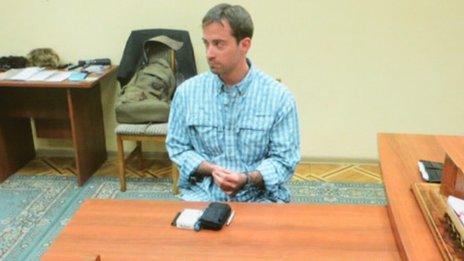My father's double life as a British spy
- Published
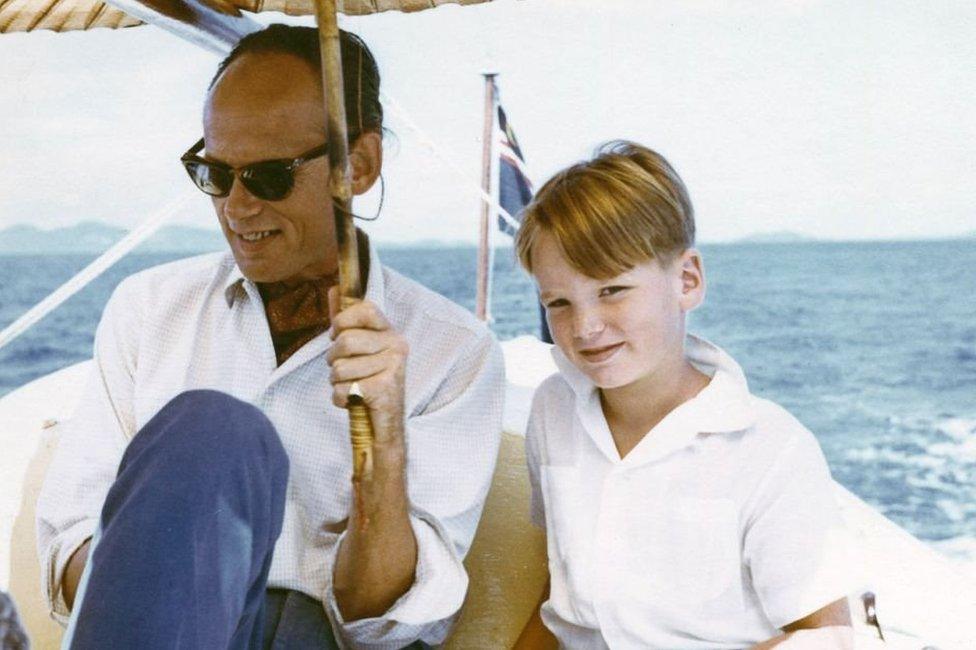
Mark Colvin, aged seven, with his father, off the south coast of Malaysia in 1959
Many sons have difficulty deciphering their father, but few more than Mark Colvin.
As a boy in the 1950s and 1960s, Colvin knew his dad as a dedicated British diplomat whose job took their family all over the globe.
The pair had a strong bond, but there were unanswered questions. John Colvin worked long hours, shared few details about his job and sometimes kept his family at arm's length.
Colvin and his sister, Zoe, sometimes joked their father might be a spy.
Only years later, in 1976-77, did they learn he worked for MI6.
A double life
John Colvin was posted to Malaysia in 1957 after diplomatic postings in Norway and Austria, where his real mission had been to undermine Soviet imperialism.
With a young family in tow, he began running counter-insurgency troops during the Malayan Emergency.
"When we went to live in Kuala Lumpur, I believed he was straight-out diplomat," Mark Colvin said.
"I went out into the jungle one time with him and reviewed a troupe of jungle fighters - hill tribesmen - but I thought that was part of his normal work. I thought he was a colonial diplomat. I didn't realise that was essentially part of his intelligence work."
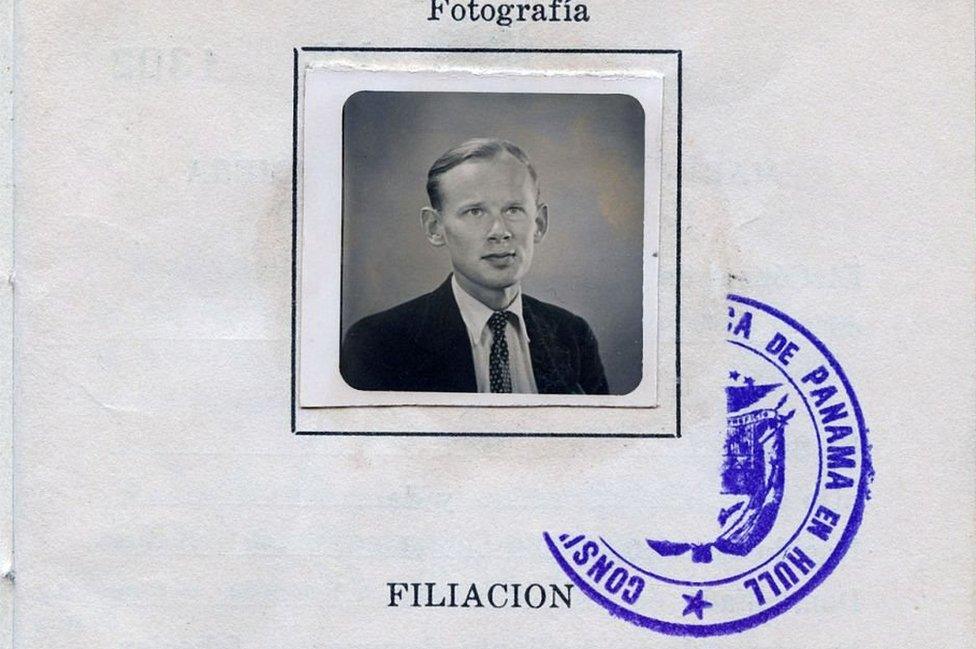
John Colvin's 1949 Panamanian Merchant Navy registration papers
Family life ran parallel with espionage as the Cold War continued.
But the stresses of the job eventually contributed to the breakdown of John's marriage to Mark's mother, Anne Manifold. In time it also strained the relationship with his children, who remained in the dark about his work.
Later, during Mark's teenage years, his father left to be British Consul-General in Hanoi, then capital of North Vietnam. The perilous post thousands of miles from his family came amid Operation Rolling Thunder - a massive US-led bombing campaign.
John remarried and was appointed ambassador to Mongolia in 1974, before leaving to take up his final post in America.
"I had a very good relationship with my father but it was sometimes very distant," Mark Colvin remembers.
"He was often not there and a couple of assignments that he took meant being a very long way from civilisation."
Learning the truth
Mark was in his 20s and working as a journalist for the Australian Broadcasting Corporation when his mother first revealed the truth about his father.
Suddenly incongruous details about John, such as warning his children not to travel to the Soviet Union, began to make more sense.
Mark found it was beneficial to keep the secret.
In the paranoid atmosphere of 1970s Australia, the young journalist did not want to be pigeonholed as "the son of an MI6 officer".
But having not seen John for five years, Mark arranged to meet him in New York on the first leg of an around-the-world trip.
It was there, over lamb cutlets and claret at the Knickerbocker Club, that his father finally admitted his work.
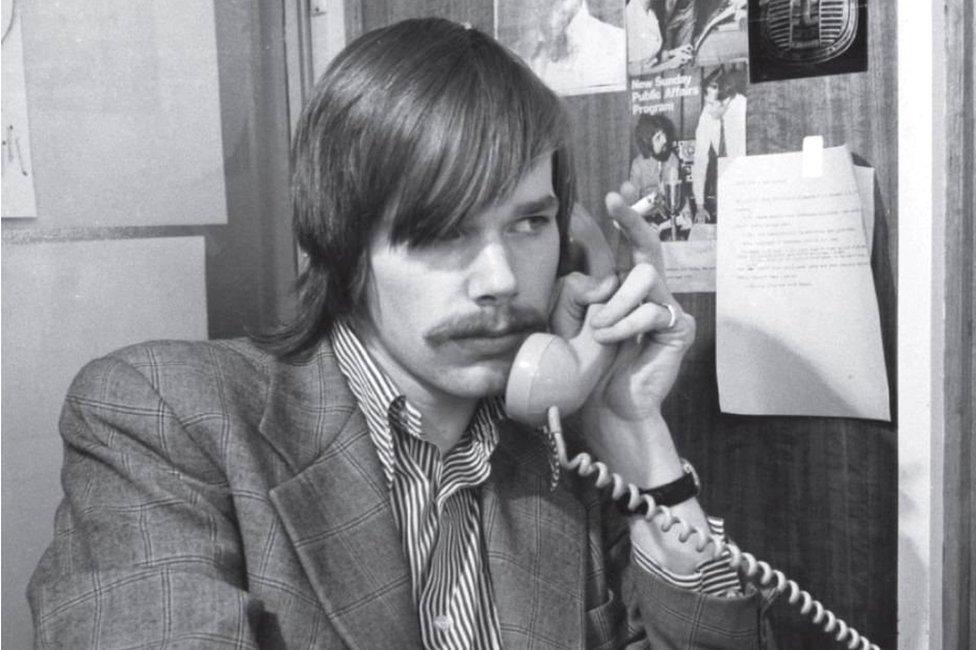
Mark Colvin working as a reporter for the ABC in 1976
What was revealed could not be divulged to anyone. His position as a political counsellor at the British embassy in Washington was a "cover". In reality, he was the head of station for MI6. He had replaced Kim Philby, a double agent who famously defected to the Soviet Union.
In the wake of the Cambridge Spies scandal, John's job was to liaise between British intelligence agencies ("The Friends") and the CIA ("The Cousins").
He ultimately retired from the intelligence service in 1980, and took up a position with Chase Manhattan Bank in Hong Kong. There he reviewed books for British newspapers and wrote a memoir and a series of books on military history. He died in 2003.
Reconciling the past
Mark Colvin, now a veteran journalist and radio presenter for the ABC, began taking a deeper look at his father's life when he sat down to write his new autobiography, Light and Shadow.
By writing the book, he came to a realisation that their lives were bound by the Cold War. As one waged war covertly as a secret agent, the other covered it as a foreign correspondent.
While he knew his father so well, in other ways he didn't know him at all.
"He was an absent father some of the time and a present father a lot of the rest of the time," he said.
"It was a very good relationship but then he would just not be there for unexplained reasons."

Read more:

- Published30 June 2011
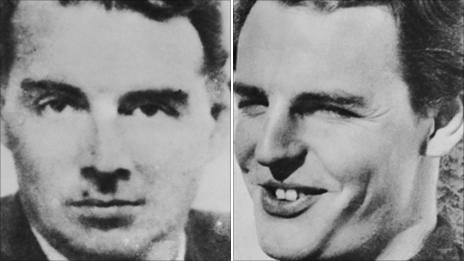
- Published15 May 2013
